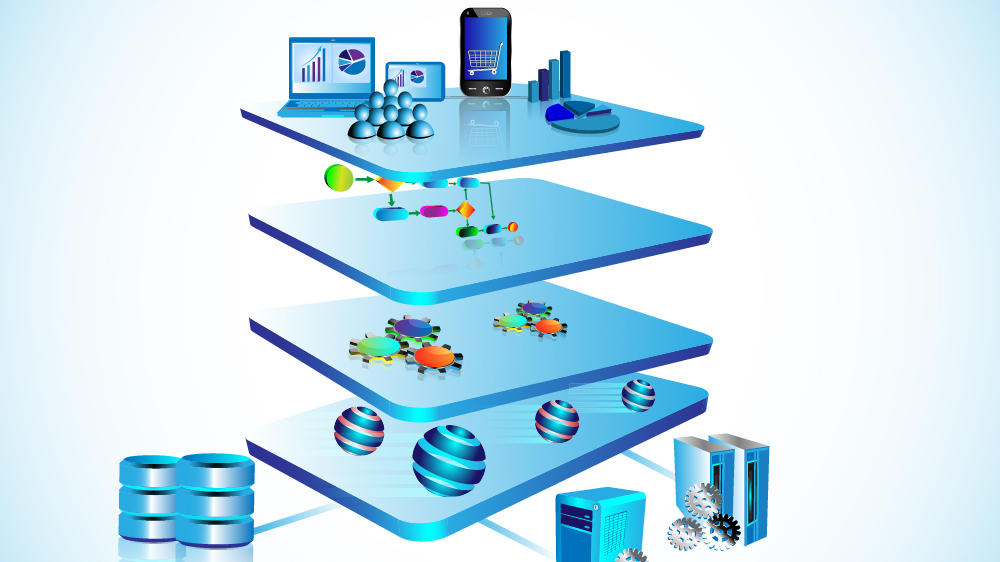
Standardized Systems Engineering and Assessment In research and technology transfer projects, the Design and Assessment Group develops solutions that help companies achieve their strategic and business goals.
Today's inescapable conditions are rapidly changing requirements, historically grown, heterogeneous IT application landscapes and short technological innovation cycles. To enable business information systems to fulfil their tasks in this area of conflicting interests, flexible and agile concepts are required both in the development of individual applications and in the evolution of IT application landscapes.
Engineering of standardized systems
An exciting field of application is the future energy supply system, which is increasingly based on IT - the so-called "smart grid": Increasingly decentralised management of energy flows and the spread of decentralised, regenerative generators are changing the existing communication and energy distribution structure. This cannot usually be mapped with existing IT systems, so that a corresponding further development of the architecture of both individual IT systems and interacting systems is necessary. Standardization plays a major role in ensuring interoperability between the systems.
The Group applies its broad methodological knowledge in the area of designing standardized systems for complex IT structures to consulting in the areas of enterprise architecture and software development.

The purpose of Enterprise Architecture (EA) is the documentation of relevant information at various levels of an enterprise; such as strategies, business processes, the IT application landscape and the IT infrastructure.
Linking this information across levels helps to gain a better understanding of the relationships between levels. For example, it provides insight into which business processes are supported by which software applications or which projects will change what part of the IT application landscape. Tools for the analysis and visualization of these relationships support decision makers and designers both in business and IT.
Enterprise Architecture Management (EAM) deals with the long-term planning of IT and how IT is best aligned with the business goals of an enterprise. It enables the goal-oriented designed and control of IT projects so that a continuous evolution towards the best IT support for business needs is possible.

Software Architecture
Flexibility is one of the most important requirements of modern business information systems; systems are required to be quickly and inexpensively adaptable to new or changing business processes. Model-driven software development (MDSD) meets the demand for increased flexibility through the use of modeling and generator technology. However, model-driven approaches are only slowly gaining importance in practical application for a number of reasons:
- Existing model-driven approaches tend to focus on the development of new software systems and neglect the very important need for integration and evolution of existing systems in practice.
- Additionally, today's model-driven methods encapsulate technical platform specifics well, but still require input models, which are often conceptually only slightly more abstract than program code. The cost of creation and maintenance are difficult to lower.
- A third reason is the lack of adequate tool support of model-driven development. Available tools are often specialized to individual development steps, but poorly combinable with other tools, so that universal support for model-driven projects becomes an obstacle.
Assessment of standardized systems
The increasing decentralization of energy management due to the growing number of decentralized, renewable generators requires changes to the established communications and power distribution structures. These are usually not coverable by existing IT systems - integration in a plug-and-play seldom possible. An increasing number of new standards and norms are under development to achieve the interoperability of field devices and control systems. OFFIS is actively participating in national and international standardization processes, such as the IEC or the German VDE / DKE. The CISE (Center for IT Standards in the Energy Sector) is the OFFIS Competence Cluster for automation and network control technology and provides training in standards, support during the implementation of projects and guidance for technology choices by manufacturers, energy suppliers and advisors.
Our topics:
- Safety Considerations
- Standards
- Informationmodels in the Energy Sector

Persons 
F
J
K
L
M
N
S
W
Projects 
2025
2024
Duration: 2024 - 2025
Interoperability test platform for components of the energy transition
Duration: 2024 - 20272023
National Research Data Infrastructure for the Interdisciplinary Energy System Research
Duration: 2023 - 20282022
Untersuchung von Anforderungen, Lösungsmustern und Methoden zur Befähigung produzierender Unternehmen für GAIA-X
Duration: 2022 - 20242021
WärmewendeNordwest – Digitalisierung zur Umsetzung von Wärmewende- und Mehrwertanwendungen für Gebäude, Campus, Quartiere und Kommunen im Nordwesten
Duration: 2021 - 2026
Intelligente Digitalisierung der Energieversorgung zur Optimierung des Netzbetriebs und zur Erhöhung der Akzeptanz
Duration: 2021 - 2024 Publications 
2025
Ferenz, Stephan and Miller, Bernhard and Busse, Christian and Demandt, Évariste and Eberl, Franziska and Ebert, Barbara and Fluck, Juliane and Förstner, Konrad U. and Goedicke, Michael and Hennig, Christine and Jagusch, Gerald Wolfgang and Jansen, Lukas and Keller, Christin and Krieger, Ulrich and Rettberg, Najla and Schrade, Torsten and Seegert, Jörg and von Suchodoletz, Dirk and Trippel, Thorsten and Weidtkamp-Peters, Stefanie; April / 2025
Kamsamrong, J. and Widl, E. and Schwarz, J. S. and Heussen, K. and Raussi, P. and Arnold, G. and De Paola, A. and Feng, Z. and Werth, O. and Pham, M. C. and Tran, Q. T.; European Guide to Smart Energy System Testing: The ERIGrid 2.0 Approach for Evaluating Complex Smart Energy System Configurations; Dec / 2025
Manzek, Luca and Niemann, Laura and Steinert, Alexandro and Wagner, Henrik and Werth, Oliver and Penaherrera, Fernando and Lier, Sarah K.; February / 2025
Seiwerth, Corinna and Schwarz, Jan Sören and Fuentes Grau, Laura and Qussous, Ramiz and Schmurr, Philipp and Liu, Nan and Pan, Zhiyu and Steinert, Alexandro; Electronic Communications of the EASST; Dec / 2025
Dumitrescu, Roman and Riedel, Oliver and Henke, Michael and Metternich, Joachim and Ihlenfeldt, Steffen and Koldewey, Christian; 2025
Eugenia Dorkaev, Oliver Werth, Mathias Uslar; Proceedings of the 31st Americas Conference on Information Systems; August / 2025
Strasser, Thomas I. and Widl, Edmund and Gregor, Carlos Ayon Mac and Ginocchi, Mirko and Kuchenbuch, Rene; October / 2025
Hasselbring, Wilhelm and Druskat, Stephan and Bernoth, Jan and Betker, Philine and Felderer, Michael and Ferenz, Stephan and Hermann, Ben and Lamprecht, Anna-Lena and Linxweiler, Jan and Prat, Arnau and Rumpe, Bernhard and Schoening-Stierand, Katrin and Yang, Shinhyung; Computing in Science & Engineering; 2025
Van Genuchten, Joep and Guitart, Laia and Aynon Mac Gregor, Carlos and Kuchenbuch, René and Strasser, Thomas I.; Open Research Europe; August / 2025
Ferenz, Stephan and Werth, Oliver and Nieße, Astrid; Electronic Communications of the EASST; February / 2025

